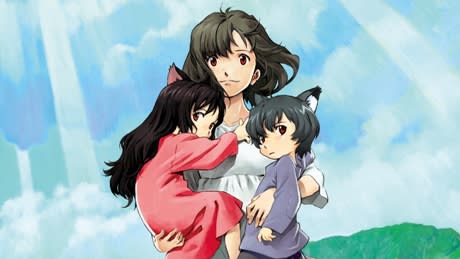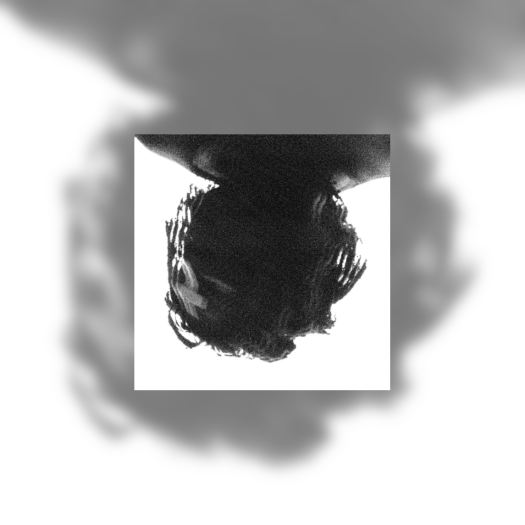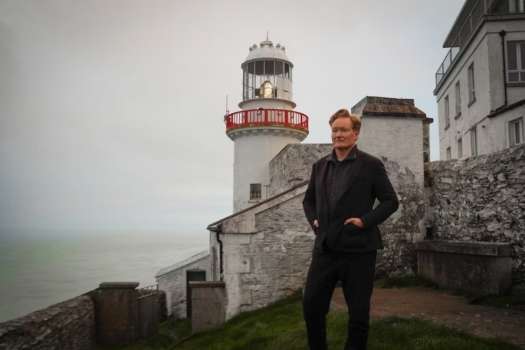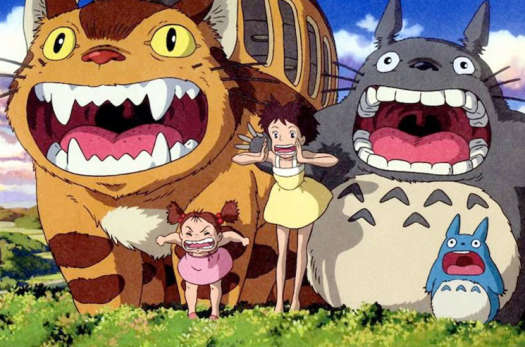Though similar in aesthetic and tone to the works of the internationally renowned Hayao Miyazaki, Mamoru Hosoda's Wolf Children is far more grounded in familiar reality both in concept and in animation specificities such as the realist portrayal of nature and architecture framing the traditional anime characters. It's initially disorienting, being forced into a realist eye, especially when the expectation is that of magical, metaphoric elements, considering that this is a story about a woman that marries a wolf man and has two wolf children.
But what becomes clear early on, when Hana winds up a widow shortly after the birth of her second child, is that this is a quiet, achingly tender, human story using the fantastical to make larger than life feelings of heartache, love and ambivalence within the family unit.
Forced into the social periphery for survival, aware of how society would respond if one of her children were to transform into a wolf at an inopportune moment, Hana moves her spirited older daughter Yuki and more introspective son Ame to the country, determined to stay removed from imposing expectations on them. Save teaching them caution about keeping their wolf identity a secret, she allows them to vacillate between a standard human upbringing and that of nature's design.
Inevitably, Hana's caution is challenged by Yuki's persistent curiosity, forcing her to enrol her daughter in nursery school, despite her instinct to protect and shelter her daughter from the dangers of the world.
It isn't difficult to draw parallels between standard parental anxieties and the ones being presented here, especially when Yuki and Ame eventually grow apart, with her struggling to hide her animalistic side and him embracing it, eschewing the limitations of a world unprepared to deal with his difference. In such, the impending pain of impermanence and change builds up over the runtime, inevitably reaching a breaking point where the safety of the family is forced to shift and change.
As Yuki ages and tentatively learns to trust those that aren't her mother, Ame quietly retreats from the world and accepts a destiny inconceivable to his loving mother, who in turn struggles to stand by her promise to let her children live free from parental repression. The resulting coming-of-age story works on all levels, whether they are that of empty nest anxiety or adolescent fears or an analysis of nature vs. nurture.
With deliberate pacing and thoughtful composition that allows feelings to swell as we watch cobwebs in the rain or waterfalls on the mountains, Mamoru Hosoda's deeply moving and astoundingly contemplative work touches on the fleeting nature of life. Though devastating and gut-wrenching, the process of love, family and eventual moving on is considered a thing of beauty and something to be appreciated during the brief moments for which it lasts.
Wolf Children screens on Saturday November 10th at 8:15pm at the Royal theatre.
(Studio Chizu)But what becomes clear early on, when Hana winds up a widow shortly after the birth of her second child, is that this is a quiet, achingly tender, human story using the fantastical to make larger than life feelings of heartache, love and ambivalence within the family unit.
Forced into the social periphery for survival, aware of how society would respond if one of her children were to transform into a wolf at an inopportune moment, Hana moves her spirited older daughter Yuki and more introspective son Ame to the country, determined to stay removed from imposing expectations on them. Save teaching them caution about keeping their wolf identity a secret, she allows them to vacillate between a standard human upbringing and that of nature's design.
Inevitably, Hana's caution is challenged by Yuki's persistent curiosity, forcing her to enrol her daughter in nursery school, despite her instinct to protect and shelter her daughter from the dangers of the world.
It isn't difficult to draw parallels between standard parental anxieties and the ones being presented here, especially when Yuki and Ame eventually grow apart, with her struggling to hide her animalistic side and him embracing it, eschewing the limitations of a world unprepared to deal with his difference. In such, the impending pain of impermanence and change builds up over the runtime, inevitably reaching a breaking point where the safety of the family is forced to shift and change.
As Yuki ages and tentatively learns to trust those that aren't her mother, Ame quietly retreats from the world and accepts a destiny inconceivable to his loving mother, who in turn struggles to stand by her promise to let her children live free from parental repression. The resulting coming-of-age story works on all levels, whether they are that of empty nest anxiety or adolescent fears or an analysis of nature vs. nurture.
With deliberate pacing and thoughtful composition that allows feelings to swell as we watch cobwebs in the rain or waterfalls on the mountains, Mamoru Hosoda's deeply moving and astoundingly contemplative work touches on the fleeting nature of life. Though devastating and gut-wrenching, the process of love, family and eventual moving on is considered a thing of beauty and something to be appreciated during the brief moments for which it lasts.
Wolf Children screens on Saturday November 10th at 8:15pm at the Royal theatre.




